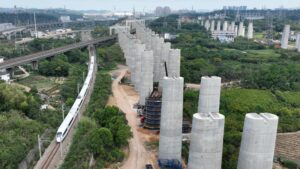Welcome to the Extreme Investor Network, where we provide unique insights into the world of finance that you won’t find anywhere else. Today, we’re diving into the current economic landscape in China, specifically focusing on the impact of the real estate slump on local government finances and debt.
In recent years, China has experienced a significant slowdown in consumption, which can be attributed to the country’s real estate market woes. Chinese households have traditionally invested a large portion of their wealth in real estate, but with Beijing cracking down on developers’ excessive debt levels since 2020, property values are now on the decline. This has led to a decrease in land purchases and a substantial drop in local government revenue, particularly at the district and county levels.
According to analysts at S&P Global Ratings, it may take three to five years for local government finances to recover from the current situation. Wenyin Huang, a director at S&P Global Ratings, highlighted that delays in revenue recovery could prolong debt stabilization efforts, as debt levels continue to rise.
To recoup lost revenue, local authorities in China are doubling down on efforts to collect taxes. This includes digging into historical records to identify potential tax issues from past operations. Companies across various sectors have received notices to pay back taxes dating back to the mid-1990s, resulting in significant financial burdens for businesses.
The pressure to reclaim tax revenue has caused an uproar online and added to already fragile business confidence. The CKGSB Business Conditions Index, a monthly survey of Chinese businesses, has indicated a contraction in recent months, further exacerbating the economic challenges facing the country.
As Chinese authorities navigate the delicate balance between reducing debt levels and stimulating economic growth, experts warn of the risks associated with the local government financing vehicle (LGFV) sector. These entities have taken on substantial debt to fund public infrastructure projects with limited financial returns, posing a significant risk to the banking sector.
At the Extreme Investor Network, we provide in-depth analysis and exclusive insights into the evolving financial landscape in China and beyond. Stay tuned for more expert commentary and unique perspectives on the latest trends in the world of finance.

